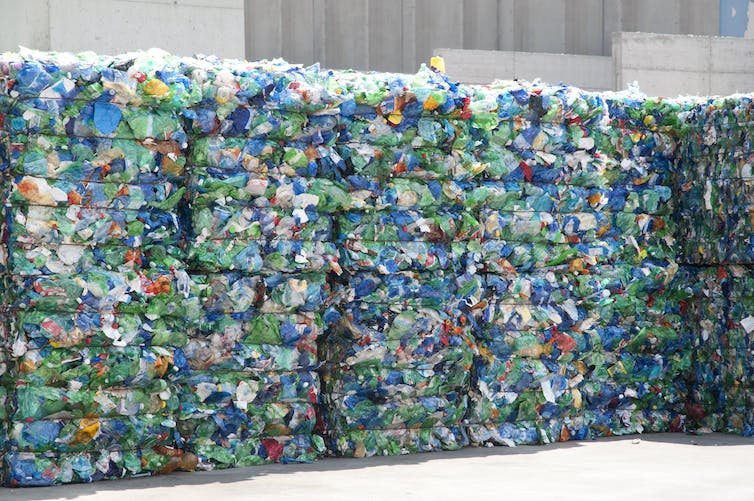Unrecycled drink containers are an enormous drawback within the UK. A survey by Planet Patrol, a non-profit organisation, discovered that the drinks business was answerable for greater than a 3rd of the litter discovered within the UK in 2020 and 2021. The gadgets included plastic and glass bottles, metallic drinks cans, single-use cups and lids.
This is a priority. Litter takes years to degrade, inflicting hurt to wildlife and habitats, and cleansing it up is dear. Street cleansing prices UK taxpayers an estimated £1 billion annually.
The Scottish authorities has proposed a deposit return scheme. People pays a 20p deposit after they purchase a drink in a single-use container, which they get again when the empty bottle or can is returned. Scottish drinks containers would additionally must be specifically labelled and tracked.
But the scheme is underneath risk. The UK authorities is unlikely to conform to the commerce exemption wanted to allow commerce guidelines in Scotland to vary from the remainder of the UK. And critics argue {that a} deposit return scheme can be tough for smaller retailers in an already aggressive sector as a result of prices of dealing with returns and registering with the scheme.
However, related schemes in different European international locations have prevented enormous volumes of litter from coming into the surroundings. These deposit return schemes supply perception into how efficient a measure they are often and supply a attainable route for implementation within the UK.
Plastic litter is an environmental concern and a drain on public funds.
Vladimir Gjorgiev/Shutterstock
Evidence from Europe
In Finland, a deposit return system for glass bottles was launched within the Fifties and continues at this time, having included plastic drinks containers for the previous 20 years. The scheme is operated totally by the personal sector, with 5,000 plastic container-return machines situated throughout the nation in outlets, motels, eating places, workplaces and faculties.
Each time an individual buys a drink in a bottle or a can, they pay a 15 to 40 cent deposit, relying on the fabric the container is made out of. The containers are then recycled or the supplies are reused on their return.
Almost each bottle and may in Finland is recycled on account of the scheme. In 2020, Finnish residents recycled 94% of aluminium cans (out of 1.4 billion offered) and 92% of plastic bottles (out of 530 million). By distinction, simply 82% and 57% have been recycled within the UK respectively.
Norway has achieved an much more spectacular recycling charge of 97%. Norway’s deposit return strategy is as an alternative supplemented with an environmental tax imposed on bottle producers. The tax is NOK 6.46 (£0.50) per unit of metallic and glass and NOK 3.91 (£0.30) for plastic gadgets. To keep away from the tax, producers should recycle greater than 95% of the containers they produce.
Plastic bottles often find yourself being “downcycled” into different gadgets, like fleece supplies. But the tax has inspired producers of plastic bottles in Norway to make bottles simpler to recycle through the use of extra uniform and fewer contaminated supplies. Efforts have included utilizing accredited bottle tops and glue and labels which might be simpler to take away. The high quality of recycled plastic in Norway is now so excessive that recycled bottles could be made into new bottles.
Plastic recycling schemes in Europe have additionally delivered social advantages. The Finnish system permits folks to decide on to gather their deposit or donate it to charity. In Berlin, these not inclined to return their bottles to the shop can depart them underneath bins for others to gather and declare the reward.

Plastic bottles at a recycling plant.
Moreno Soppelsa/Shutterstock
Public acceptance
The success of a deposit return scheme largely depends upon what occurs to the merchandise as soon as it’s returned. Success is just not based mostly on financial viability alone. Any deposit return scheme must be acceptable to the individuals who run and use it.
Cost-benefit evaluation of two separate deposit return schemes (recycling and reuse) for plastic meals trays in Sweden discovered that the prices are better than the advantages for recycling, however not for reuse. If you take into account the prices concerned in packaging, washing and the recycling course of, then a return scheme may go finest if the merchandise is reused.
In Scotland, considerations about how the scheme will run and its actual profit are chipping away on the confidence of the general public and drinks retailers. Research finds that many individuals in Scotland are unaware of how the deposit return scheme would function and why it’s mandatory. Some of the research’s individuals even perceived the refund cost as one other type of taxation imposed by the Scottish authorities.
Communication performs a vital position. A unique research, which explored the general public acceptance of a deposit return scheme in Catalonia, Spain, revealed that the best way a scheme is introduced to customers and the way a lot data is given influences how it’s perceived. More data (given over the cellphone) tended to yield a extra constructive viewpoint.
Clearly, extra data is required for Scotland’s recycling scheme to be accepted extra extensively.
If designed appropriately, deposit return schemes can encourage recycling by elevating the worth of plastic waste. Recycling and reuse schemes are additionally made extra technically and economically viable if backed up with tax incentives.
But the barrier dealing with the adoption of a deposit return scheme within the UK is an absence of uniformity. We shouldn’t be asking if Scotland ought to undertake a scheme or not. Instead, plans for the remainder of the UK to undertake this strategy needs to be accelerated to get the entire of the UK on the identical web page.
![]()
Sharon George receives funding from Research England.
